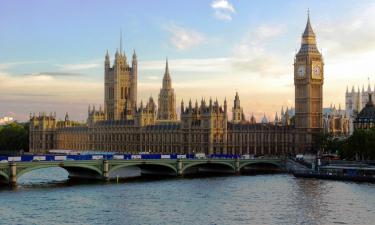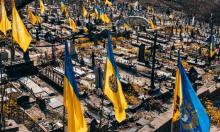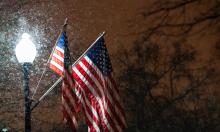Four guerrillas killed in heavy Hezbollah-Israeli border fighting; Israel blames Syria, Iran
Hezbollah rockets blasted Israeli army outposts Monday and Israel's warplanes and artillery pounded guerrilla targets across the border in a sharp escalation of hostilities linked to political upheaval in Lebanon and Syria's growing isolation under a cloud of suspicion it had a hand in killing a former Lebanese prime minister.
Witnesses in southern Lebanon said the heavy exchanges lasted for two hours in the evening and continued intermittently into the night. The witnesses said Hezbollah guerrillas were firing rockets mounted on trucks in near the border, targeting Israeli army positions. Israeli warplanes launched another airstrike late Monday night, Lebanese security officials reported.
Hezbollah guerrillas blamed Israel, but the Jewish state said it Hezbollah attacked first and with the backing of its supporters in Syria and Iran.
The first major cross-border conflict in five months left four guerrillas dead and several Israeli soldiers wounded, according to accounts from both sides.
The United States, which considers Hezbollah a terrorist organization, condemned the guerrilla rocket attacks against Israel, but also urged Israel to exercise restraint in its response.
The most serious battle between Hezbollah and Israeli forces in more than three years could not be separated from the political situation in Lebanon and intense international pressure on Syria to cooperate with a U.N. investigation into the assassination of Rafik Hariri, the former Lebanese prime minister, in the face of possible sanctions.
Hezbollah, the powerful Shiite Muslim militant group in control of the Lebanese side of the border with Israel, is a main ally of Syria in Lebanon. It has in recent weeks stepped up its criticism of the United Nations and its investigation into Hariri's killing.
Syrian President Bashar Assad earlier this month attacked the probe _ which implicated Syrian officials in the February murder _ as politicized. Assad said the U.N. _ and behind it America _ was out to frame Syria to pressure it to withdraw support for Palestinian militant groups, step up efforts to stop border infiltration of militants into with Iraq and to stop interfering in Lebanon. He said he would cooperate with the probe but vowed not to bow to pressure.
An escalation of tension in southern Lebanon would strengthen Syria's hand in the standoff with the U.N. by focusing attention on the need for a stable Syria as a key to peace in Lebanon, where it kept a large military force for nearly three decades.
Israel hinted it was prepared for additional retaliation, which could further erode the security situation.
"Israel will do all possible to protect its residents in the north," Israeli Defense Minister Shaul Mofaz told a news conference. He said consultations continued on next steps.
He blamed Syria and Iran for the attacks, saying they were designed to ease international pressure on Damascus.
"Behind the fire in the north stand also Syrian and Iranian interests to ignite the northern border and turn the attention from Syria which today is under heavy international pressure," Mofaz said.
In Washington, State Department spokesman Sean McCormack said the attack was a "deliberate provocation" by Hezbollah and urged Lebanon's government to take charge. "We have made it very clear to the Lebanese government that they need to control the situation in southern Lebanon," he said.
Hezbollah also has been nervous about the political changes in Lebanon after the withdrawal of the Syrian army in April in the wake of international and domestic outrage over Hariri's assassination. The group, which led the guerrilla war against Israel's 1982-2000 occupation of part of southern Lebanon, is under international pressure to disarm under a 2004 U.N. Security Council resolution that demanded that all militias in Lebanon give up their weapons.
The guerrilla group has refused to lay down its arms under that resolution, which also calls on the government to deploy its army along the international border. Despite assurances from the government, of which Hezbollah is part, the group has expressed bitterness toward Prime Minister Fuad Saniora, claiming he has promised the United Nations to disarm the guerrillas.
In Monday's fighting, the Israeli army said Kiryat Shemona and Metulla, border towns in the upper Galilee panhandle, were targeted by Katyusha or other rockets but there were no casualties. Hezbollah officials, however, said their fire was aimed at army positions in the disputed Chebaa Farms and nearby areas, without referring to the two towns.
Hezbollah acknowledged three guerrillas were killed and later its Al-Manar TV station said a fourth died of wounds sustained in the fighting. In a statement, Hezbollah said it fired on Israeli army vehicles that crossed into Lebanon at the border village of Ghajar, in the southeastern corner, killing or wounding several soldiers.
The Israeli army said there were several casualties among soldiers in the border exchange, but would not give details. Israel TV said four guerrillas were killed as they tried to infiltrate the targeted area to kidnap Israeli soldiers. Military spokeswoman Maj. Avital Leibovich said the Hezbollah attack was unprovoked.
Hezbollah's Al-Manar television and other Lebanese stations said one Israeli soldier was killed and seven others wounded in Hezbollah fire and that two Israeli tanks were destroyed.
Although Hezbollah officials have in the past hinted at the possibility of kidnapping Israeli soldiers to exchange them for Lebanese prisoners held in Israel, the statement did not say that Monday's attack was designed to take soldiers hostage.
In Israel's counterattack, gunners pounded suspected guerrilla hideouts near the border with 155-mm howitzers. An army spokesman in Israel said the Israeli Air Force attacked a structure used as a command post by Hezbollah and several access routes in southern Lebanon.
Lebanese security officials said Israeli warplanes struck far from the combat zone, in the hills overlooking the Mediterranean southern port city of Tyre. The officials spoke on condition of anonymity because they were not authorized to speak to the press, AP reported. V.A.
Subscribe to Pravda.Ru Telegram channel, Facebook, RSS!





